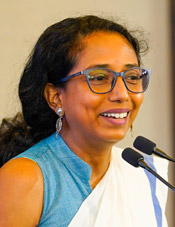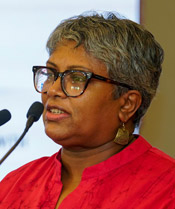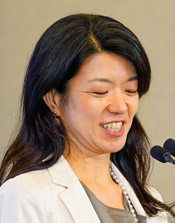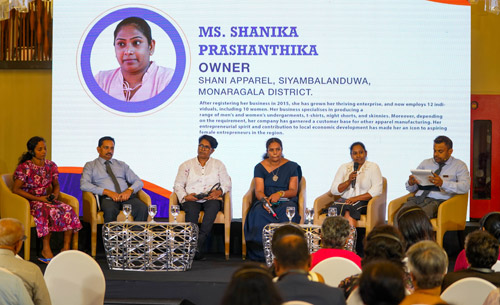Women mean business as they speak out
It’s an oft-heard tale but however often the echoes are heard, it does not make the tale any less pitiful or unfair.
The crux is that women, whether in micro, small or medium enterprises, find it doubly hard to get money to run their businesses though they sweat and toil, while balancing their wifely and motherly duties.

Niyanthini Kadirgamar
Why are these women facing inequitable access to finance? It became crystal clear when speaker after speaker at a recent event highlighted the major barriers such women face, while the answer lay in the fact……“api chuti minissu nisa (because we are small people)”.
The cry from the rooftops which followed was: “Punchi apita nagitinna denna (help us stand up).”
‘Systems Change’ was the battle-cry when the woes of these women were brought to the fore with the strident call ‘What does it take for women to succeed in the MSME (micro, small and medium enterprises) sector? The crescendo reached was the launch of ‘Women mean Business: A Coalition for Action’.
The hope is that the coalition would enable inter-agency and inter-disciplinary coordination and collaboration for sustainable solutions, create opportunities to challenge the current system that discriminates against women-led MSMEs especially when accessing financial resources and bring together a network of like-minded organizations committed and willing to foster economic justice for women.

Ashika Gunasena
The doers seeking a holistic systems change on the rainy evening of May 30 in Colombo were ‘Chrysalis’ (a Sri Lankan organization working to empower women and youth) together with the United Nations Development Programme (UNDP) and other key stakeholders. These stakeholders were from the state and private sectors, banking and finance sectors, civil society organizations (CSOs), academia and women engaged in the MSME sector from across the country.
The Sri Lankan data put forward were an eye-opener:
- Only 25% of entrepreneurs in the MSME sector are women
- Only 32% of women are in the labour force, even though the female literacy rate is 95%
- Only 23.7% of women account for enterprise-based apprenticeship-training
- The unemployment rate of women (9%) is twice that of men, but women spend 6.8 hours on unpaid housework and care-work per day
- Only 16% of all privately-owned land belong to women, while the personal lives of women leave much to be desired – 20.4% ever partnered women have encountered physical and/or sexual violence by an intimate partner in their lifetime

Azusa Kubota
Focusing on the challenges for women in obtaining funds and engaging in income-generating activities under the current economic crisis, a member of the Feminist Collective for Economic Justice, Niyanthini Kadirgamar reiterated that the economic crisis threatens to unravel the progress made in relation to women’s status in Sri Lanka – on health, education and food security.
“Women have been forced to bear the risks of the failing economy by finding means to put food on the table for their families amidst an increased cost of living and decreased employment and income opportunities. The unpaid care-work burden has increased because they can no longer afford to buy nutritious food for their children, pay for essential medicines or use electric appliances at home due to the electricity tariff hikes,” she said.
She pointed out that the government has not provided adequate relief to working women to face the risks of a failing economy. Therefore, women are forced to find other coping mechanisms, including selling or pawning their assets, such as jewellery and land, and obtaining loans for the consumption of basic necessities. Women are more vulnerable to exploitation by financial institutions who want to profit from this situation.
“These factors exacerbate the inequalities already existing for women to obtain funds to continue their livelihoods and to participate in the economy under just conditions and equal pay,” added Ms. Kadirgamar who is a PhD candidate at the University of Massachusetts Amherst, USA.
An interesting panel discussion with women from MSMEs in the Northern, Uva, Central and Western Provinces shed light on how “very” difficult it was to find finances.
Getting a loan from a bank was a near impossibility as they just did not have the collateral, the discussion moderated by the Manager Programmes & Small Businesses of Chrysalis, K. Vinopavan revealed. The panellists were V. Divya, owner of ‘Best Fashions’ in Nuwara Eliya; Shanika Prashanthi, owner of ‘Shani Apparel’ in Moneragala; Nujika Aluthge, Marketing Director & Showroom Manager of ‘Harshi Batiks’ in Horana; Saman Senevirathne, owner of ‘Sandaliya Bimmal’ (mushrooms) of Matale; and Bapu Suthasini, trainer & producer of palmyrah-based products of Mullaitivu.
Later M.R.Y Harshani Kumari told the Sunday Times of her travails in setting up Harshi Batiks. It had been from a paper quilling award winner as a schoolgirl that she had moved to batik, but even with that recognition she had not been able to get a loan from the state bank where she had her account.
That bank was only willing to give her a loan to expand her batik business at the very high interest rate of 24%, when the small industries sector was encouraging banks to charge only 8%. Finally, leaving the giant banks out of her plan, Harshani had turned to a rural bank.
Now with more and more awards to her name, Harshani has five women working at her factory in Gampola, while Nujika manages her showroom at Horana.
“Now the big banks are falling over themselves to give me credit,” laughs Harshani.
Explaining that Chrysalisunderstands the complex multitude of challenges women and youth face, which marginalize them on the basis of their gender, age, ethnicity, religion and class, its Chief Executive Officer (CEO) Ashika Gunasena stressed that despite such challenges, they believe that these are the leaders Sri Lanka requires to fulfil its potential.
“We promote inclusive growth,” she said, pointing out that Sri Lanka needs a system that works for women.
Underscoring that UNDP is a strategic and critical partner in the process of change including the ‘Women mean Business Coalition’, UNDP Sri Lanka’s Resident Representative, Azusa Kubota, said that economic independence expands choices for women and is a key driver of gender equality.

The panel discussion on the plight of women entrepreneurs
Ms. Kubota added that the collaboration ensures that women in the MSME sector receive the comprehensive support they need so that they are at the centre of efforts to improve the ecosystem, for their benefit.
Chrysalis has in the past supported 254 MSMEs and 2,050 livelihoods in 12 districts. These MSMEs have generated revenue of over Rs. 5.5 billion to-date, created 7,702 direct and 12,200 indirect jobs and supported multiple value chains.
Meanwhile, the ‘Women mean Business: A Coalition for Action’ is supported by the Co-Impact Gender Fund, a global organization focused on building just and equitable systems.
Searching for an ideal partner? Find your soul mate on Hitad.lk, Sri Lanka's favourite marriage proposals page. With Hitad.lk matrimonial advertisements you have access to thousands of ads from potential suitors who are looking for someone just like you.


